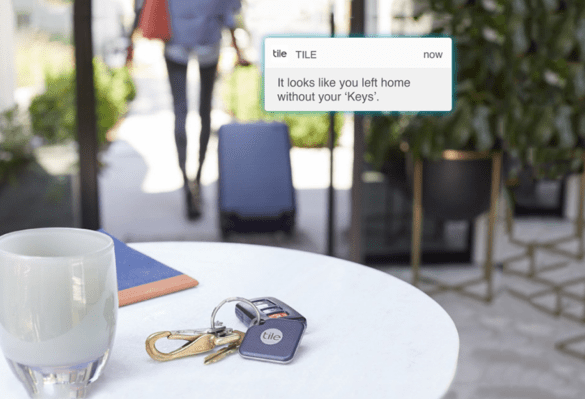Tile — the company that makes popular square-shaped tags and other technology to help people keep track of physical belongings like keys and bags — has made more recent moves to link up with chipmakers, helping it expand to wireless headsets and other electronic and other connected items as part of a wider smart home strategy. Now, Tile is announcing a round of funding of $45 million to double down on those strategies and fulfill a plan to have its technology in millions of devices by the end of this year.
The growth equity is being led by Francisco Partners, with participation from previous investors GGV Capital and Bessemer Venture Partners and new backers Bryant Stibel and SVB Financial Group.
CJ Prober — who joined as CEO last year in part to develop Tile’s newer areas of business — said in an interview that the funding will help the startup be more aggressive in doubling down on these new opportunities.
“We’re seeing great business momentum, with the first embedded partner products from our strategic initiatives coming out this year,” he said. It now has partnerships with five semiconductor companies, including Qualcomm and most recently Nordic, which they integrate Tile functionality on to their hardware, he added. “All this is now paying off with great momentum.”
Prober would not comment on the company’s valuation with this round, except to say that it was definitely an up round. A spokesperson described the Series C as having “opened” with this $45 million commitment, which implies that there may be more funding coming, but Tile has declined to specify any more detail on this front. The startup had previously raised rounds in stages — as you can see by this timeline in PitchBook. For some more context, Tile’s last noted valuation (also in PitchBook) was around $166 million, but that was now more than two years ago, before the various initiatives and other changes at the company.
Tile is not disclosing any metrics on its market share or how many of its devices are now in use, but it typically is rated as the largest of a crowded market for item-tracking devices (with others in the space including TrackR (Adero), Chipolo, and more).
But it notes that its European business (a relatively new area of focus for Tile) has grown by 160% in the last quarter. That’s coming from a small base, though: Prober confirmed that the U.S. is still by far its biggest market in terms of sales and users.
And it also had a strong Prime Day on Amazon this year, doubling its unit sales (but didn’t provide hard numbers for comparison). It said it has exceeded projections for sign-ups for its Premium tier, which provides free battery replacements, 30-day location history, smart alerts (prompting you, for example, when you’ve left your keys somewhere), customer support and more for $30 for the year, or $3 per month.
The company has been planting a lot of seeds, and some of them have yet to sprout. Last year, Tile announced that it would take an investment from Comcast to help it develop new products for its wider connected consumer strategy.
Prober, however, described this as still in the “roadmapping phase” and would not get into specifics except to say that there are a number of different initiatives in the works. There also was a partnership with Google unveiled at the most recent I/O that will see its home devices also being able to be tracked by the Tile platform.
I asked Prober if he worries ultimately about whether large tech companies like Apple, Amazon, Google and the rest — which all want to “own” connected home customers and the ecosystem of hardware and services that they may use — are seen as opportunities or threats for Tile, given that it’s piggy backing on their platforms and devices. His and the company’s fundamental feeling — one that should be supported in the spirit of competition and consumer choice — is that having a cross-platform option is the way to go.
“Our customers have different devices, products from different companies and it’s our job to ensure that Tile works well across all of those,” he said. “We see ourselves a little bit like Switzerland, which is also something that our customers and partners appreciate.”
While we’re seeing a surge of new communications technologies and protocols — 5G being perhaps the one we are hearing about most at the moment — Tile is sticking to Bluetooth for now.
“We love what Bluetooth enables for our customers in terms of the form factor, the cost and profile of the device and the power consumption,” said Prober. “We’re constantly evaluating different alternatives, and if there is an alternative we would consider that, but in our view that doesn’t exist right now.”
It’s a choice that its investors are also supporting.
“Tile pioneered the smart location category,” said Andrew Kowal, partner with Francisco Partners, in a statement. “With Bluetooth technology projected to be included in nearly 30 billion devices shipping in the next five years, Tile is poised to deliver an embedded finding solution for a rapidly expanding market. We are extremely excited to be partnering with Tile as the company enters the next chapter of its growth story.”
